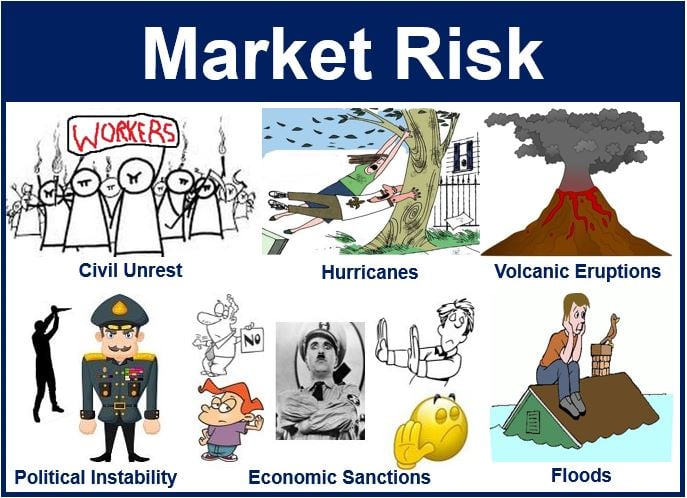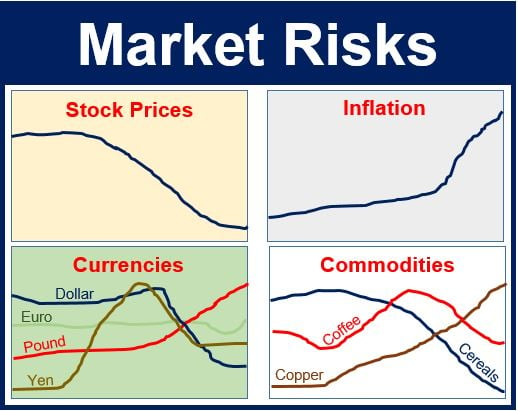What is market risk? Definition and meaning
Market risk refers to the risk that an investment may face due to fluctuations in the market. The risk is that the investment’s value will decrease. Also known as Systematic Risk, the term may also refer to a specific currency or commodity.
Market risk is generally expressed in annualized terms, either as a fraction of the initial value (e.g. 6%) or an absolute number (e.g. $6).
Market risk contrasts with specific risk, also known as business risk or unsystematic risk, which is tied directly to a market sector or the performance of a particular company. Market risk also encompasses the volatility of the entire financial system, which can be influenced by a myriad of factors, from central bank policy changes to global economic shifts.
In other words, market risk refers to the overall economy or securities markets, while specific risk involves only a part.

There are several standard market risk factors, including:
- Equity Risk: the risk that share prices will change.
- Commodity Risk: the likelihood that a commodity price, such as that of a metal or grain, will change.
- Currency Risk: the probability that foreign exchange rates will change.
- Interest Rate Risk: the risk that interest rates will go up or down.
- Inflation Risk: the risk that overall rises in prices of goods and services will undermine the value of money, and probably adversely impact the value of investments.
According to the Bank of England, the relevant variables are “primarily interest rates, exchange rates, and the spreads between the yields of securities issued by sovereigns and by other types of issuers.”
Diversification and market risk
Risk can be reduced to some extent if you diversify your investments, i.e. widen your portfolio. However, it is impossible to eliminate all risks.
Some market risks are not possible to prevent or foresee. Natural disasters, such as hurricanes, volcanic eruptions and earthquakes can strike at any time and may affect the value of your investments.
Other sources of market risk include terrorist attacks, political instability, recessions, and trade embargoes.
Geopolitical risks, such as changes in government policy or international relations, can have significant impacts on market dynamics and investment valuations.
Market volatility, driven by investor sentiment and public economic indicators, can also introduce a degree of unpredictability to the performance of investments across various sectors.
According to the Board of Governors of the Federal Reserve System (America’s central bank):
“Market risk encompasses the risk of financial loss resulting from movements in market prices.”
The European Banking Authority (EBA) defines market risk as the risk of losses on-and-off balance sheet positions that occur as a result of adverse movements in market prices. “From a regulatory perspective, market risk stems from all the positions included in banks’ trading book as well as from commodity and foreign exchange risk positions in the whole balance sheet,” the EBA adds.
The majority of investors know that investing comes with risks as well as rewards, and that , overall, the greater the risk, the bigger the potential reward.
While it is vital to consider the risks in the context of a specific market or investment class, it is also just as important to consider market risk.

Example of market risk concept
Imagine you wish to buy a car. You can purchase a new one under full warranty, or a second-hand vehicle with no warranty. Which one you choose depends on how much you can afford, which features are important for you, your knowledge of mechanics, and your risk tolerance.
As you check out different cars, you find that some makes and models perform better than others, and have superior repair histories.
However, regardless of which vehicle you eventually decide upon, there are several risk on the road which have nothing to do with your chosen car, but which can impact your driving experience considerably.
Examples include animals crossing the road, being hit by lightning, weather conditions, icy roads, traffic lights working incorrectly, being mugged by a street gang while you’re waiting at a red light, to mention just a few. While these factors might be beyond your control, you need to be aware of them.
The Financial Industry Regulatory Authority, a private corporation in the US that acts as a self-regulatory organization, has the following advice for investors:
“Investments involve varying levels and types of risks. These risks can be associated with the specific investment, or with the marketplace as a whole. As you build and maintain your portfolio, remember that global events and other factors you cannot control can impact the value of your investments. And be sure to take both business risks and market risks into account.”
Two Videos
These trwo educational videos, available on our affiliated YouTube channel Marketing Business Network, provide clear and easy-to-understand explanations of the terms ‘Market Risk’ and ‘Economic Risk.’
-
What is Market Risk?
-
What is Economic Risk?

